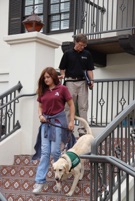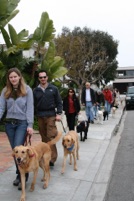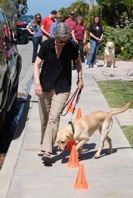We met regularly under the direction of our Leaders who were trained by GDB. These informational meetings offer a place to learn about training techniques, meet with other Raisers, and participate in excursions with the puppies. Meetings generally lasted about two hours depending on the activities scheduled.
Our puppies are raised to become special partners for people with special needs. For this reason, GDB puppies must be trained somewhat differently than pet dogs. Raisers always need to consider how the puppies’ actions will affect their future partners.
![]()
Our Leaders taught raisers how to use positive reinforcement praise-based training techniques utilizing food rewards. Raisers also refer to the GDB produced ‘Guide Dog Puppy Raising Guidebook‘ to keep them on course. Raisers were taught how to use well-timed rewards for good behavior, not only in the form of food but also verbal and physical praise. Raisers use an encouraging, enthusiastic, soothing or loving tone of voice during verbal praise. Physical praise includes petting, stroking, and sometimes a light hug for those pups that respond to a hug. Food reward bags, like the leash and puppy jacket, are a part of the basic equipment for a Raiser. Harsh forms of punishment for inappropriate behavior are never used nor approved by GDB.
You may see some puppies wearing a Gentle Leader head collar during training. This is not a muzzle, but a kind and gentle training tool to help the puppy learn without applying pressure to the throat. All puppies will experience successful use of a head collar prior to returning for formal training.
Raisers use love, patience, practice, consistency, and praise when teaching the puppies.



![]()
Socializing our puppies was one of the most important, and most enjoyable, aspects of raising a guide dog puppy. As puppy Raisers, we know that capable, successful working guide dogs may be asked to safely and confidently guide their visually impaired partners in a variety of different settings and experiences. The socializing we do with our pups teaches them to act appropriately in any environment and prepares them for their future jobs.
A few of the places we took our puppies include: grocery stores, school and work, restaurants, shops and malls, Fun Day events and movies. Shopping malls and retail stores are favorite places for us to socialize our puppies in training. Not only are there a variety of sights, sounds and smells, but our pups had a chance to meet a vast cross section of people of all ages.